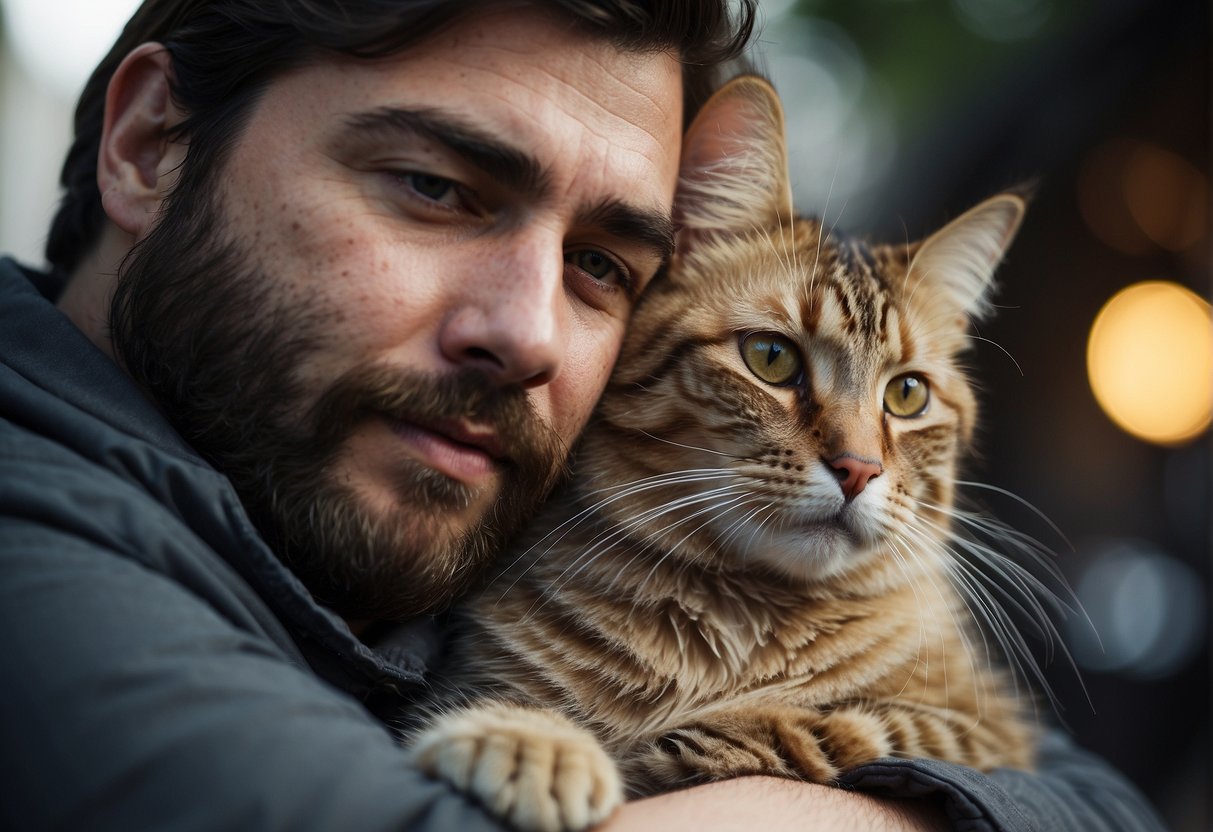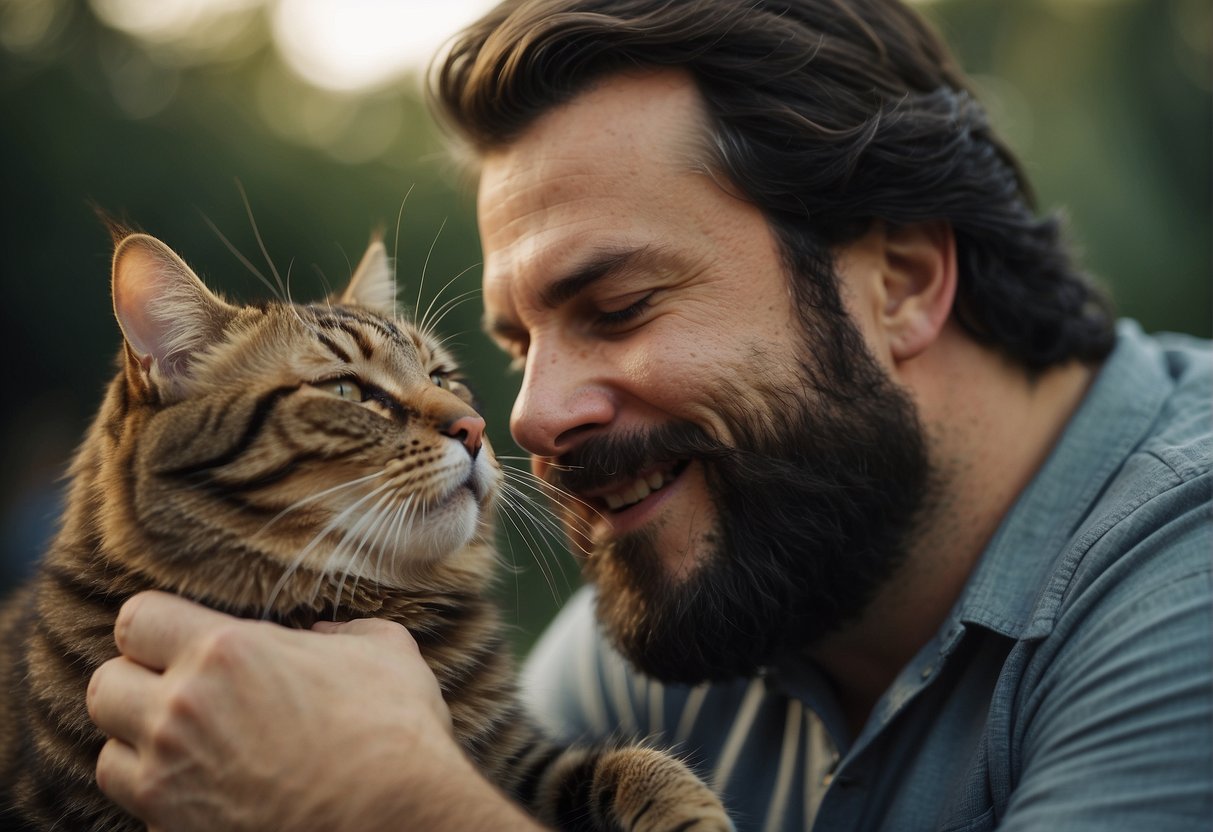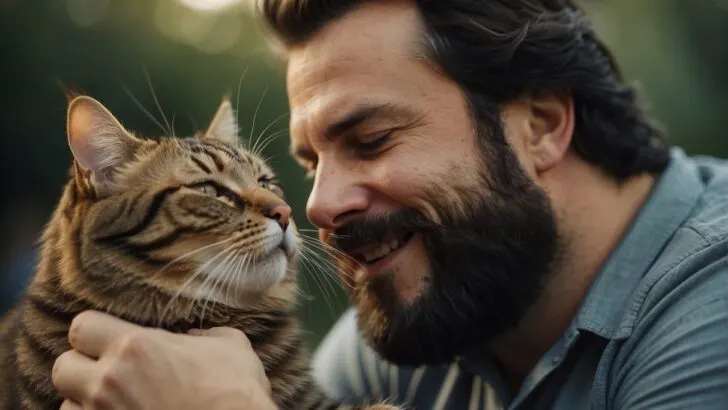Cats are often drawn to beards, and this peculiar fascination comes down to a few simple reasons. For your whiskered friend, a beard might feel like the ultimate comfort zone, mirroring the softness and warmth they associate with their own fur or that of their feline companions.
Picture your cat kneading on a fluffy blanket or snuggling against another cat; your beard essentially gives them that same cozy vibe.

When cats encounter a beard, it’s not uncommon for them to exhibit grooming behaviors, such as nuzzling or even ‘pawing’ at it gently. This isn’t just about the pleasant sensation for them, but it’s also a sign of their affection and trust towards you.
After all, grooming is a significant part of a cat’s social life, often reserved for their closest companions in the animal kingdom, which in your shared home, translates to you.
Some may be absolutely smitten with any facial hair they come across, while others might be more reserved or particular about the texture or length. Through understanding these unique preferences, you can appreciate the special bond that forms when your cat shows a keen interest in your beard.
The Science of Affection
Understanding why your cat is so fascinated with your beard can deepen the connection you share. It’s all about the way cats communicate and seek comfort through behaviors that are deeply rooted in their instincts.

Communicating Through Scent
Your beard is a treasure trove of smells that carry a lot of information for your cat. You’re familiar with their head bumps; when cats rub against your beard, they are using the scent glands located on their cheeks and head to mark you as territory.
This serves as both a claim of ownership and an act of affection. They’re saying, “You’re part of my family.” The pheromones they deposit are chemical signals that are unique to them, creating a comforting signpost of their presence.
Through these scent exchanges, both of you become familiar to one another, establishing a mutual understanding and a shared territory that is marked safe and friendly.
It’s similar to how they might engage in mutual grooming or allogrooming with other cats they’re close to, building bonds and reinforcing social structures.
Grooming Behaviors and Comfort
The act of grooming is an intimate part of feline behavior that extends to their interactions with you. If your cat licks your beard, they’re engaging in grooming behavior, which is a nurturing and caring signal in the feline world. This isn’t just about cleanliness—it’s a behavior that represents trust and love.
In nature, cats will groom each other in a practice called allogrooming, commonly between family or colony members.
By grooming your beard, your cat may be expressing a desire to care for you as they would their own kin, providing comfort and affection. Additionally, your beard might resemble a cat’s fur to some extent, which could ignite their instinct to groom.
Health and Safety Aspects
When considering the charming interaction between your cat and your beard, it’s essential to be aware of both the endearing implications for feline health as well as the potential health risks that come with such close contact.
Promoting Feline Health
Your cat’s fascination with your beard might have some health benefits for them. This behavior can be a sign that they feel comfortable and safe with you, which is critical for their emotional well-being.
Cats are prone to stress, which can lead to health issues, so a stress-free environment supported by affectionate interactions is beneficial. Additionally, the act of grooming or rubbing against your beard may simulate their natural grooming behaviors, which are pivotal for a cat’s mental health and stress relief.
- Comfort: Close contact and grooming can reduce anxiety.
- Grooming Simulation: Encourages natural behavior, promoting psychological health.
Potential Health Risks
While a cat nuzzling into your beard is endearing, be aware of the health considerations. The main risks involve the transmission of infections. Cats can carry zoonotic infections like ringworm, which can be transmitted to humans through direct contact.
- Zoonotic Infections: Such as ringworm, which can spread from their fur to your beard.
- Human Health: Your beard could carry substances that might not be safe for your cat to ingest during licking.
To minimize risks:
- Maintain good hygiene for both your beard and your pet to prevent the spread of infections.
- Regularly check for any signs of health issues in your cat, such as patchy fur or excessive grooming, which might suggest stress or an underlying health problem.
Cats’ Sensory and Social World
Understanding why they might be attracted to something as unique as a beard can give you insight into their sensory and social world.
Sensory Attraction to Beards
Your cat’s world revolves significantly around scent and touch. The unique aroma trapped in your beard, whether it’s from your natural scent or remnants of food, can be irresistible to them.
Cats have a keen sense of smell, and beards often capture a variety of scents that may pique your pet’s interest. Additionally, the texture of a beard might remind them of their mother’s fur, providing a sense of comfort and security.
- Fur Texture: If your beard is particularly soft, it might be the closest thing your cat can find to its own fur. This tactile sensation can be quite appealing, leading to them pawing or nibbling at your beard.
- Scent Marking: When your cat rubs against you, they are also spreading their own scent, marking their territory as they mingle it with yours, which can reinforce a sense of mutual affection.
Social Interaction and Bonding
Beards can play a part in social behaviors such as grooming and bonding.
When your cat licks or nibbles at your beard, they might be engaging in a communal grooming behavior that is a sign of affection and an indication that they consider you a part of their social group or family. This behavior helps to strengthen the bond between you and your cat.
- Facial Expressions: Just as you read your cat’s body language, they are attuned to reading yours, including facial expressions that may be accentuated by the presence of a beard.
- Jealousy and Security: If they perceive that your attention is divided, especially in multi-pet households, they might seek to establish a sense of security by cuddling up to your beard, which serves as a familiar comfort zone for them.
Behavioral Reasons and Quirks
Cats are creatures of habit, with each quirk and behavior often rooted in instinctual practices or individual preferences. By understanding these, you unlock insights into why your whiskered companion may show a particular fondness for your beard.
Natural Instincts and Routines
Food and Grooming Habits: Cats associate beards with many familiar routines. For example, beards often carry scents of food, which can entice your feline friend.
Your grooming habits matter too; a well-maintained beard might resemble a cat’s own grooming instincts. Cats are meticulous about their fur, and they may view your grooming routine as a shared activity, strengthening the bond between you.
-
Warmth and Comfort: Your beard provides a plush comfort that mimics the warmth of a cat’s own fur. Cats have an affinity for finding cozy spots to nap, and the softness and warmth of a beard can make it an appealing naptime destination.
-
Marking Territory: When your cat rubs against your beard, they’re not just seeking your attention. This action is part of their routine to mark territory. Within the scent glands located on their cheeks, cats have pheromones that they transfer onto surfaces they claim – which can include your beard!
Curious Quirks and Preferences
Boxes and Scratchy Textures: Ever noticed how cats love squeezing into boxes or are fascinated by scratchy textures? A beard can similarly intrigue them due to its scratchy quality. This stimulates your cat’s sensory experiences and mimics the tactile complexity of the environments they would explore in the wild.
- Hunting and Playing: The movement of a beard might remind a cat of the fluffiness and motions associated with prey and toys, prompting their innate hunting instincts.
- Grooming Instincts: Cats often groom each other as a sign of affection and social bonding. If your cat attempts to groom your beard, it’s a sign that they’re comfortable with you and accept you as part of their family.

My name is James, and welcome to FAQCats!
Along with our team of cat owners, expert pet enthusiasts, and pet professionals, we aim to write engaging helpful, engaging content about cats. At FAQCats we strive to provide content that’s accurate and fun to read. Our team writes about everything related to cats; even the most complex of topics. Through extensive research and caring for our own fur-pals, we’re able to provide something cat owners worldwide will love. Have a look around, and leave us feedback anytime!

